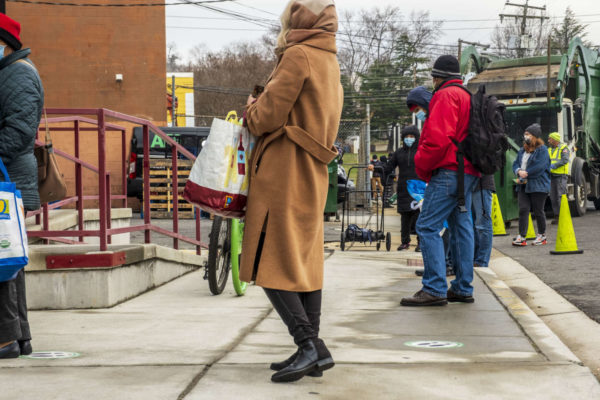
Sally Diaz-Wells, who coordinates the food pantry at Our Lady Queen of Peace Catholic Church in Arlington, just got the weekly egg bill.
It was $2,000, which makes up nearly 20% of the church’s weekly budget of $12,000 for purchasing food for distribution.
Arlington Food Assistance Center CEO Charles Meng says the wholesale price for a dozen eggs in January 2021 was $0.98. This month, AFAC paid $4.45 per dozen. Overall, food prices are up 35% for AFAC, which is already over its $1.3 million budget by $160,000.
The uptick in food prices, driven largely by inflation, is squeezing local food and meal distributors, which are at the same time seeing more Arlington residents come, and come more often, for free food. Inflation again is to blame for this, as clients report their earnings are covering less of their grocery bills, local food assistance providers said during an Arlington Committee of 100 panel on hunger held Wednesday.
“These numbers are not pandemic-related numbers,” Meng said. “These are numbers related to the basic need in Arlington, plus the burdens based on our families by inflation in particular.”
Providers say this is hitting the working poor the worst.
“This group comes to us when they need us, once or twice a month,” Meng said. “When their other benefits start running out, they’ll come to us more often.”
They tend to come after paying for other necessities like rent, utilities and medical expenses, says Stephanie Hopkins, the food security coordinator for Arlington County Department of Human Services.
“We find that people spend their available income on rent, utilities and medical expenses, and other bills, and if there’s enough money to pay for food, they will pay for their own food,” she said. “If there’s not enough money, that’s when they lean on food assistance network.”
More families who otherwise would be able to pay are leaning on Arlington Public Schools for meals, too, says Amy Maclosky, the director of the Office of Food and Nutrition Services for APS.
“Student meal debt has increased a lot this year and it has increased for paying students,” Maclosky said. “Every student is entitled to a free breakfast and lunch, whether they have the funds or not, but they do incur debt. Our debt is up $300,000 right now among people who do not qualify for free or reduced but aren’t able to pay.”
The rising need for food assistance needs comes as Arlington County is preparing to launch this month a Food Security Coalition tasked with implementing some two dozen strategies for tackling hunger.
Food insecurity affects about 7% of Arlington residents — 16,670 people — says Hopkins. It disproportionately affects people of color: 53% and 20% of AFAC clients are Hispanic or Latino and Black, respectively, while comprising 16% and 9% of the county’s population.
Food insecurity can mean “‘I’m worried that my food will run out before I have enough money to get more,’ to ‘I have zero food in my house,” Hopkins said. “We know there are people on both ends of that spectrum in Arlington and people journey that spectrum all the time.”
Hopkins started her job in February 2021. Since then, she worked with the Urban Institute to publish a report on hunger in Arlington and assembled a task force that drafted the strategies the coalition will now implement. These include adding food distribution sites, increase food deliveries and rescues, diversifying outreach efforts and collecting better data.
Hopkins predicts demand will rise more in March. That is when some 5,000 Arlington families on SNAP benefits, also known as food stamps, will lose about $82 in benefits per household member per month.
“Normally, benefits are based on your income and expenses. During the pandemic, everyone was receiving the maximum amount for their family’s size,” Hopkins said. “That is scheduled to end in February [as] part of the omnibus spending bill that passed in December.”
Food distributors emphasized that their efforts rely on financial contributions, in-kind donations from local farmers and supermarkets, and work from dedicated volunteers.
“Last year, Jan. 5, we were in the middle of a snow storm, and so our volunteers — being as intrepid as they are — they showed up and they still offered food to people who showed up right along with them,” Diaz-Wells said. “There was a need.”
The first Food Security Coalition meeting will be Monday, Jan. 23 at 1 p.m. at Arlington Central Library. Registration is available online.
Those who need assistance can call 703-228-1300 or consult a map of distribution sites for food, diapers, financial assistance and clothing.

